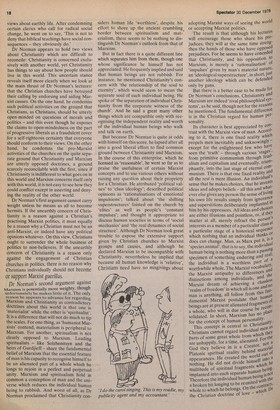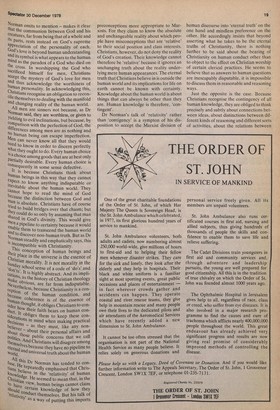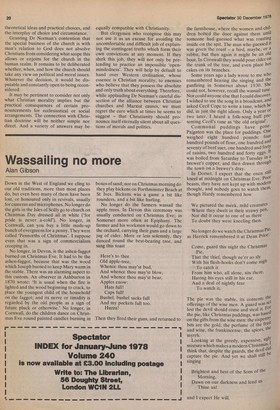A reply to Dr Norman
Shirley Letwin
When a man valiantly ventures into the arena to fight off the beasts, it may seem ungrateful to complain about the shape of his sword. Dr Norman's attack on the present political engagements of Christian churches, his unfashionable insistence that the true business of the church is with the relation of man to God, and his daring to say all this as Reith lecturer is eminently brave, refreshing, and welcome. Nevertheless it is a pity that he tried to slay the enemy with a seriously flawed weapon. A profound selftontradiction runs through his lectures.
Dr Norman maintained that Christianity is about the 'evocation of the unearthly'. He condemned the 'compulsive moralism of contemporary intellectual culture', which has led Christians to suppose — wrongly — that Christianity has , moral implications; morality, he said, is not the essence of Christianity which is about 'the unearthly.' Accordingly he condemned all those, be they on the Left or the Right, who think Christianity bears or should bear on politics. He criticised all 'secular programs for human improvement' for distracting Chris tians from a concern with 'correct religious belief' and made a point of saying that the Russian church today, because it is excluded forcibly from politics, is more truly a church than in the West.
From all this it follows that clergymen who engage in politics are thereby distracted from their proper function of promoting 'correct religious belief'. But it might just as easily follow that a clergyman with sufficient time and energy could do justice to both politics and religion. For if, as Dr Norman put it, Christianity is about the unearthly, and politics is about earthly matters, then why should they not coexist easily?
Yet on the other hand, Dr Norman said many things which imply that Christianity has a great deal to say about life on earth. He talked,for instance, about the 'Christian culture' of Victorian England — and 'culture' is the way people live in this world rather than the next. Again, he held that the views of 'humanists' stand 'in direct contradiction to received religious attitudes', which suggests that Christianity contains views about earthly life. After condemning certain clerics who call for radical social change, he went on to say, 'This is not to deny that biblical teachings have social consequences — they obviously do.'
Dr Norman appears to hold two views about Christianity which are difficult to reconcile: Christianity is concerned exclusively with another world, yet Christianity has things to say about how people should live in this world. This uncertain stance reveals itself more clearly when we look at the main thrust of Dr Norman's lectures: that the Christian churches have betrayed their calling by endorsing and aiding Marxist causes. On the one hand, he condemns such political activities on the ground that Christians, as Christians, should be utterly open-minded on questions of morals and politics — and this even though he exposes the claims to open-mindedness on the part of progressive liberals as a fraudulent cover for a self-righteous certainty that everyone should conform to their views. On the other hand, he condemns the pro-Marxist activities of the churches on the quite separate ground that Christianity and Marxism are utterly opposed doctrines, a ground scarcely reconcilable with the first, since if Christianity is indifferent to what goes on in this world and Marxism concerns itself only with this world, it is not easy to see how they could conflict except in asserting and denying the reality of the other world.
Dr Norman's first argument cannot carry weight unless he means us all • to become hermits. Tithe unearthly concern of Christianity is a reason against a Christian's practising Marxist politics, it must equally be a reason why a Christian must not be an anti-Marxist, or indeed have any political opinions whatever. On this view, Christians ought to surrender the whole business of politics to non-believers. If the unearthly concern of Christianity is a reason only against the engagement of Christian churches in politics, there is no reason why Christians individually should not become
or support Marxist guerillas.
Dr Norman's second argument against Marxism is potentially more weighty, though unfortunately he makes little of it. The only reason he appears to advance for regarding Marxism and Christianity as contradictory doctrines about this world is that one is 'materialist' while the other is 'spiritualist'. It is a difference that will not do much to tip the scales. For one thing, as 'humanist Marxists' contend, materialism is peripheral to Marxism. For another, spiritualism is not clearly opposed to Marxism. Leading spiritualists — like Solzhenitsyn and the heirs of Gurdjieff — share the fundamental belief of Marxism that the essential feature of man is his capacity to recognise himself to be an alienated part of a whole which he longs to rejoin in a perfect and perpetual unity. Marxism and spiritualism hold in common a conception of man and the universe which reduces the individual human being to rubbish. And worst of all, as Dr Norman proclaimed that Christianity con siders human life 'worthless', despite his effort to shore up the ancient crumbling, border between spiritualism and materialism, there seems to be nothing to distinguish Dr Norman's outlook from that of Marxism.
But in fact there is a quite different line which separates him from them, though one whose significance he himself has not appreciated. He frequently implied and said that human beings are not rubbish. For instance, he mentioned Christianity's concern with 'the relationship of the soul to eternity', which would seem to mean the separate soul of each individual being. He spoke of 'the separation of individual Christianity from the corporate witness of the church'. And he said a great many other things which are compatible only with recognising the independent reality and worth of the individual human beings who walk and talk on earth.
But because Dr Norman is quite at odds with himself on this score, he lapsed after all into a good liberal effort to find common ground between Christianity and Marxism. In the course of this enterprise, which he licensed as 'reasonable', he went so far as to praise the usefulness of certain M'arxist concepts and to use various others without raising any question about their propriety for a Christian. He attributed 'political values' to 'class ideology'; described political opinions as 'rationalisations of emotional impulsions'; talked about 'the shifting superstructures' foisted on the church by 'elites' as well as people's 'constant impulses'; and thought it appropriate to discuss human societies in terms of 'social mechanics' and 'the real dynamics of social structure'. Although Dr Norman took great trouble to expose the extensive support given by Christian churches to Marxist groups and causes, and although he declared Marxim to be incompatible with Christianity, nevertheless he implied that because all human knowledge is 'relative', Christians need have no misgivings about Spectator 30 December 1978 adopting Marxist ways of seeing the world or accepting Marxist politics. The result is that although his lectures will encourage those who share his prejudices, they will at the same time strengthen the hands of those who have opposed prejudices. For he seems to have conceded that Christianity, and his opposition to Marxism, is merely a 'rationalisation' of 'impulses' given by man's material nature, an 'ideological superstructure', in short, just another ideology which can be defended only by guns. But there is a better case to be made for Dr Norman's conclusions. Christianity and Marxism are indeed 'rival philosophical systems', as he said, though not for the reasons he mentioned. The fundamental difference is in the Christian regard for human personality. Its character is best appreciated by con' trast with the Marxist view of man. According to it, there is one fixed reality which propels men inevitably and unknowinglY — except for the enlightened few who have seen the 'truth' — through various 'stages 's from primitive communism through fend" alism and capitalism and eventually, triumphantly, into the last stage of eternal coin' munism. There is that one fixed reality and all the rest is mere illusion. An individual's sense that he makes choices, that he invents ideas and adopts beliefs — all this and what" ever else gives any person the sense of living his own life results simply from ignorance and superstitions deliberately implanted in him by his oppressors. All ideas and choices are either illusions and pointless, or, if theY, matter at all, merely refract the pers0n'3 interests as a member of a particular class at a particular stage of a historical sequence which nothing that an individual thinks or does can change. Man, as Marx put it, is a, 'species animal', that is to say, the individual human being is nothing more than a passil specimen of something enduring and real' the individual is a worthless part of a worthwhile whole. The Marxist vocabelarY' and the Marxist antipathy to differences distinctions among individuals, and the Marxist dream of achieving a classless _ 'realm of freedom' in which all is one and II° man is anything, all follow from this fuant; damental Marxist postulate that hUm beings are at present alienated fragments a whole, who will in due course be rec.°I.L. solidated. In short, Marxism has no Pla' for the concept of human personality. This concept is central to ChristiarutaY,. Christians cannot regard individual men 5 parts of some great whole from which rth.,.ey are unhappily, for a time, alienated. For.n`a God they believe in is a Creator, Platonic spiritual reality behind ma,"of appearances. He created the world out a nothing. He did not divide himself in ., he multitude of spiritual fragments Milc _ en."L. implanted into each separate humang__u Tt e Therefore the individual human being l s _ en."L. implanted into each separate humang__u Tt e Therefore the individual human being l s a broken bit longing to be reunited with " th r whole to which he belongs. On thewcohnrti. 1-7,r the Christian doctrine of love — ie the Christian doctrine of love — ie Norman omits to mention makes it clear that the communion 8etween God and his creatures, far from being that of a whole and its parts, rests instead on God's supreme appreciation of the personality of each. God's love is beyond human understanding and its symbol is what appears to the human mind as the paradox of a God who died on the cross. In worshipping the God who sacrificed himself for men, Christians acce pt the mystery of God's love for men and thus acknowledge the worthiness of human personality. In acknowledging this, Christians recognise an obligation to reconcile themselves to dealing with the manifold and changing reality of the human world. All men are sinners not because, as Dr Norman said, they are worthless, or given to Yielding to evil inclinations, but because, by comparison with the perfection of God, the differences among men are as nothing and no human being can escape imperfection. Men can never know all that they would need to know in order to discern perfectly What they ought to do. Every human choice is a choice among goods that are at best only Partially desirable. Every human choice is consequently in some sense defective. It is because Christians think about human beings in this way that they cannot expect .to know anything indisputable or inevitable about the human world. They cannot hope to read the mind of God because the distinction between God and roan is absolute. Christians have of course tried to build bridges over that chasm; but they could do so only by assuming that man shared in God's divinity. This would give men a pipeline to certainty because it would enable them to transcend the human world and to discover non-human truth. But as Dr Norman steadily and emphatically says, this iS incompatible with Christianity. This conception of human beings and their place in the universe is the essence of _k2hristian morality. It is not morality in the ‘6,11nday school sense of a code of 'do's' and _doh'ts'. It is highly abstract. And its implications s, as the history of Christian theology nimaxe obvious, are far from indisputable. c"eevertheless, because Christianity is a conb Ption of the human condition, and be_canse coherence is of the essence of 's'ivan thought, it obliges Christians to conder how their faith bears on human con,.. ‘-lact It obliges them to keep these conde .ns in mind when making making pg p ractical as they must, like any non;neve r about their personal affairs and ,.,`?.11.t those public concerns that we call And A rld Christians will disagree among ent_ themselves because they have no pipeline to 'rnal and universal truth about the human World, All this Dr Norman has tended to con use Christians He repeatedly emphasised that Chris belie i kno,,ge believe n the 'relativity' of human -.Led , He seemed to mean that, in the oristia to na certain knowledge n view, .ve human beings cannot claim of how they of how they should themselves. But his talk of relativity, as a way of putting this imports preconceptions more appropriate to Marxists. For they claim to know the absolute and unchangeable reality about which people have misconceptions that are `relative' to their social position and class interests. Christians, however, do not deny the reality of God's creation. Their knowledge cannot therefore be 'relative' because it ignores an unchanging truth about the reality underlying mere human appearances. The eternal truth that Christians believe in is outside the human world and its implications for life on earth cannot be known with certainty. Knowledge about the human world is about things that can always be other than they are. Human knowledge is therefore, 'contingent'.
Dr Norman's talk of 'relativity' rather than contigency' is a sympton of his disposition to accept the Marxist division of human discourse into 'eternal truth' on the one hand and mindless preference on the other. He accordingly insists that beyond asserting what he takes to be the eternal truths of Christianity, there is nothing further to be said about the bearing of Christianity on human conduct other than to object to the effect on Christian worship of certain clerical practices. He seems to believe that as answers to human questions are inescapably disputable, it is impossible to discuss them in reasonable and reasoning ways.
Just the opposite is the case. Because Christians recognise the contingency of all human knowledge, they are obliged to think precisely and subtly about connections between ideas, about distinctions between different kinds of reasoning and different sorts of activities, about the relations between theoretical ideas and practical choices, and the interplay of choice and circumstance.
Granting Dr Norman's contention that the special business of the church is with man's relation to God does not absolve Christians from considering what scope this allows or enjoins for the church in the human realm. It remains to be deliberated whether, when, and how the church should take any view on political and moral issues. Whatever the decision, it would be disputable and constantly open to being reconsidered.
It may be pertinent to consider not only what Christian morality implies but the practical consequences of certain pronouncements for ecclesiastical or social arrangements. The connection with Christian doctrine will be neither simple nor direct. And a variety of answers may be equally compatible with Christianity.
But clergymen who recognise this may not use it as an excuse for avoiding the uncomfortable and difficult job of explaining the contingent truths which form their own convictions at any moment. If they shirk this job, they will not only be pretending to practice an impossible 'openmindedness'. They will help by default to hand over Western civilisation, whose essence is Christian morality, to enemies who believe that they possess the absolute and only truth about everything. Therefore, while applauding Dr Norman's careful dissection of the alliance between Christian churches and Marxist causes, we must regret the cure which at times he seems to suggest — that Christianity should pronounce itself eternally silent about all questions of morals and politics.

























































 Previous page
Previous page